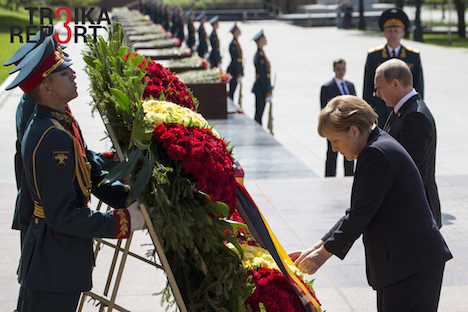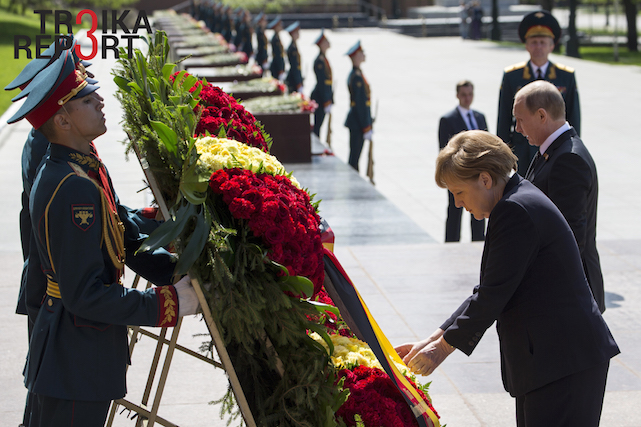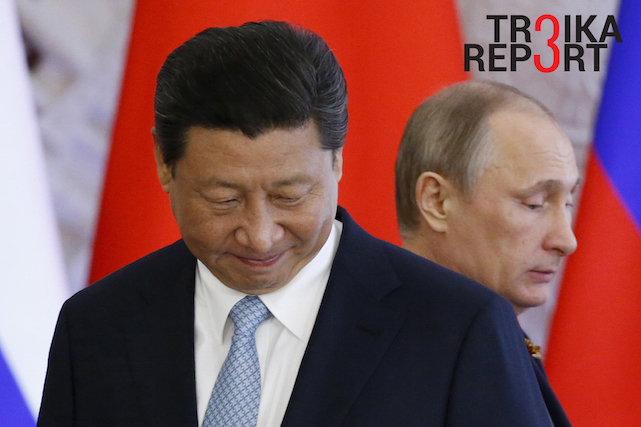

In this collage: Polish politician Andrzej Duda, left, and newly re-elected UK Prime Minister David Cameron. Source: Reuters; EPA collage
Last week the true blue Conservatives in Britain were voted once again into power in the parliamentary elections, while in Poland the incumbent president, Bronisław Komorowski, has lost in the first round to the leader of the right-wing Law and Justice party, Andrzej Duda. These developments do not offer relief to the already strained relations between Russia and its two most vociferous critics in Europe.
The re-instatement of David Cameron as UK prime minister is certain to prolong the current controversies with Moscow even despite the possible softening of Washington’s policy towards Russia in the months to come. And the rise to power of the 42-year old Duda could aggravate tensions, although not all political observers in Moscow share this pessimistic scenario.
Cynics point out that Duda, a member of the European Parliament, has identified himself with the so-called ‘Jagiellonian policy’ preached and practiced by his party’s leader, Lech Kaczyński. Basically, this policy boils down to two key goals: Position Poland as the regional leader in Eastern Europe with ambitions to act as a patron to Ukraine and to form a broad military and political coalition of post-communist states “to counter Russian expansionism.”
All in all, the changes may mean the staunchly critical stance of the UK and Poland toward Russia becomes more entrenched. But is this inevitable or simply an oversimplification? Troika Report approached Sergei Stankevich, senior expert with the Anatoly Sobchak Foundation as well as a prominent political analyst and public figure, for comment:
“The first round of presidential elections in Poland showed the significant strengthening of the Law and Justice party, which is not exactly a gift to Russia. However, it opens some opportunities for Russian diplomacy. Andrzej Duda’s party is traditionally rather skeptical towards the European Union and especially towards the Brussels bureaucracy. It is also apprehensive of Germany, seeing it as a historical opponent.
“If Law and Justice wins the election, Poland will behave in a more independent way and would break, periodically, the united European front. This situation would enable Russia to conduct a multi-vector diplomatic dialogue.”
— What about the return to power of the Tories, as skeptical of Russia as they are of Europe?
“In Britain, the Conservative leader David Cameron, following his party’s electoral victory, seems to have fallen into a self-made trap. Cameron attracted voters to his side by a pledge to keep the economy in good shape and to push Brussels back to its proper place, threatening that otherwise Britain will leave the EU. Now the Conservatives, who have obtained an absolute majority in parliament, have to fulfill their promise. And here they face the trap. A so-called “Brexit,” the potential departure of Britain from the EU, would undermine financial stability in the UK, meaning a significant outflow of capital from the country, and spelling huge damage for the national economy. It would also immediately force Scotland to demand an increase in its share of the budget’s pie.
“For Cameron, it will be, from now on, a battle on two fronts, confronting Brussels and Scotland. As a result, it could ease London’s pressure on Moscow in relation to the Ukrainian crisis and would probably – contrary to all expectations – lead to a more productive dialogue. In other words, the elections in the UK and Poland create new opportunities for Russian diplomacy.
“Russia should avoid the consolidation of any anti-Russian united front. All new opportunities should be used by Russian diplomacy to find even a temporary and even a partial compromise.”
The somewhat upbeat prophecy of Sergei Stankevich dispels the concerns in Moscow, does it not? If so, then there is, after all, a silver lining to the cloud of its troubled relations with London and Warsaw.

Russian President Vladimir Putin, right, and German Chancellor Angela Merkel, center, attend a wreath-laying ceremony at the Tomb of the Unknown Soldier in Moscow in Moscow, Russia, Sunday, May 10, 2015 Source: AP.
Festivities in Moscow marking the 70th anniversary of the victory over Nazism in Europe were boycotted by many Western powers, including the leaders of the three main allies of the Soviet Union in WWII, U.S. President Barack Obama, UK Prime Minister David Cameron, and French President Francois Hollande.
However, despite all the reserved animosity, Victory Day seemed to have a powerful appeal for reconciliation. Right afterwards there was a flurry of diplomatic activity: German Chancellor Angela Merkel flew to Moscow and later U.S. Secretary of State John Kerry came to the southern Russian city of Sochi to meet Russian President Vladimir Putin and Foreign Minister Sergei Lavrov.
Kerry had avoided visiting Russia for the last two years. This time the talks in Sochi, which lasted for eight hours, while not producing any breakthrough, were reported to have altered the ice-cold tone of previous discussions. As reported by British newspaper The Guardian, the American envoy did not even once mention the “annexation of Crimea” but insisted on the full fulfillment of the Minsk agreements on the settlement of the conflict in eastern Ukraine.
It all happened in the wake of the demonstrative move by several European heads of state and government to forgo the solemn Victory Day celebrations in Moscow in favor of a similar commemoration in Poland. In fact, the venue was chosen correctly: Gdansk and then Westerplatte, the site where World War II broke out and where Polish troops bravely fought to repel the aggressor. The events were attended by leaders of Bulgaria, the Czech Republic, Estonia, Lithuania, Romania and Ukraine.
Speaking at the Victory Day parade at Red Square in Moscow, Russian President Vladimir Putin refrained from criticizing the conspicuous absence of Russia’s old allies. Instead he said: “We are grateful to the people of Great Britain, France and the United States for their contribution to victory.” Putin also thanked the people who fought the Nazis in other countries and on other fronts, including the anti-fascists in Germany.
He also chose not to sound bellicose, simply pointing out that “in recent decades the basic principles of international co-operation have been ignored even more frequently. We see how a military-bloc mentality is gaining momentum.”
In a remarkable display of diplomatic subtlety, German Chancellor Angela Merkel, having ignored the ninth of May, paid a brief visit to Moscow the next day and laid wreaths at the symbolic burial place of the Unknown Soldier. She did reiterate Germany’s criticism of Russia’s position on the developments in eastern Ukraine, but actually subscribed to the concept of finding a peaceful solution instead of watching another round of hostilities between Kiev and the rebels in the Donbass.
So what is behind the visit to Moscow by the German chancellor and the surprise trip by the U.S. secretary of state? Could it be that Victory Day has served as an impetus for renewed attempts to find common ground? Alexander Konovalov, president of the Moscow-based Institute of Strategic Assessment, had this to say to Troika Report:
“Both sides appear to be in a deadlock. And they have comprehended that it is not acceptable to stay in this position any longer. It is necessary to restore our contacts and discuss the problems that have a vital significance for both sides.”
“There are a lot of common problems which cannot be solved on a national level, like international terrorism or war in the Middle East. But now it seems to me that the traditional agenda should be amended. The new element, the new issue that we have to think about, is what security system will substitute the Yalta-Potsdam system that was established after World War II. The Yalta system has exhausted its ability to maintain peace and security on the planet.”
“The problem is that the Yalta system was the result of the defeat of the Nazi Germany and victory in World War II. Today, no war has ended and no victory has been won. But now the necessity of establishing a new system is even more vital than it was after 1945.”
For the moment, the ice between the U.S. and Russia seems to be beginning to melt. Is this a sign of a “Reset” Mark II, or just a sign that the war of sanctions is no longer expedient?

Russia's President Vladimir Putin, right, and China's President Xi Jinping arrive at a document-signing ceremony during their meeting at the Kremlin in Moscow, Russia, on May 8, 2015. Source: Reuters Photo
The emerging non-military alliance between China and Russia has received a meaningful boost thanks to a visit to Moscow by a Chinese delegation headed by President Xi Jinping. Talks culminated in the signing of 32 bilateral agreements aimed at maximizing benefits for both parties.
The main feature of most of the deals is the commitment to long-term interaction. Gazprom, Russia’s largest energy company, and China’s National Petroleum Corporation (CNPC) signed an agreement to prolong the status of their strategic partnership for another five years. They also agreed on the basic terms and conditions of gas supplies from Russia to China through the planned Western route via the Altai.
It complements a $400 billion deal struck exactly one year ago, stipulating the supply of 38 billion cubic meters of Russian natural gas to China along the Eastern route which is under construction. The purchases of Russian gas will continue for 30 years and are likely to be extended, thus establishing a strong bond of interdependence.
The two sides also decided to set up a leasing company to promote the sale of Russian Sukhoi Superjet-100 passenger planes to Chinese and South-East Asian markets over next three years.
The most lucrative move by Beijing and Moscow was the declared linkage between the Eurasian Economic Union (which has a combined GDP of more than $4 trillion) which unites Armenia, Belarus, Kazakhstan, Russia and newcomer Kyrgyzstan, and China’s grand vision of a resurgent Silk Road.
The most visible jewel in the crown is the construction of the Moscow-Kazan high-speed railway, to be co-financed by China to the tune of $5.8 billion. The fast track will run through Kazakhstan and be extended to China.
The strategists on both sides also plan to design a new heavy helicopter, and welcome Chinese energy majors getting involved in the exploration of the hydrocarbon riches off Sakhalin Island and in the Russian sector of the Arctic.
Yury Tavrovsky, a professor at the Moscow-based Friendship University, a well-known Russian expert on China and author of a recent bestseller about President Xi Jinping published a few days prior to the Chinese leader’s visit to Moscow, made this comment for Troika Report:
“There were more than 30 documents signed during the visit, and they are all important. But I think one them is of strategic significance. It was Putin’s idea to push forward the Eurasian Economic Union which was recently joined by the sixth member, the Republic of Kyrgyzstan. On the other side, there is the Silk Road economic project put forward by Xi Jinping. Many people, including myself, first thought that these two concepts contradicted each other, and Moscow and Beijing would compete against each other in Central Asia. Now, the contradictions are over.”
According to Tavrovsky, the visit showed that the world’s second-largest economy is ready to throw its weight behind Russia’s drive to accelerate the integration processes in the post-Soviet space.
“In a few years’ time, we shall see a new Eurasia where post-Soviet nations and a mighty China will be, possibly, a free trade zone… If by that time we have normal relations with the European Union, it would mean that three big customs zones will be just one, and goods, people and services will be passing easily across the entire Eurasian continent. I think this is the most interesting and far-reaching result of Xi Jinping’s visit to Moscow.”
Apart from the raft of bilateral agreements signed between Russia and China, another low-key yet symbolic event also happened on the sidelines of the Victory Day commemorations: a meeting between Mongolian President Elbegdorj and Vladimir Putin. They discussed a “mid-term program for the development of a strategic partnership” to be signed during the Shanghai Cooperation Organization (SCO) summit in the Russian city of Ufa this July.
Russia and Mongolia eased visa requirements and plan to hold joint military exercises this summer. Coupled with the further elevation of the dialogue between Moscow and Beijing, it supports Yury Tavrovsky’s assumption that a “new Eurasia” is in the making. The Russian expert claims that attempts to turn Mongolia into a “buffer zone” hostile to both China and Russia have failed. Mongolia has chosen a different tune, and is sending the signal that it takes three to tango.
The opinion of the writer may not necessarily reflect the position of RBTH or its staff.
All rights reserved by Rossiyskaya Gazeta.
Subscribe
to our newsletter!
Get the week's best stories straight to your inbox